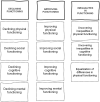Functioning Changes in Varying Ways After Retirement: A Scoping Review
- PMID: 36604784
- PMCID: PMC9830080
- DOI: 10.1177/00469580221142477
Functioning Changes in Varying Ways After Retirement: A Scoping Review
Abstract
The association between retirement and functioning remains still poorly known. This scoping review examines physical, social, cognitive, and mental functioning after retirement, describes the changes in them, determines the different aspects that affect functioning, and documents the main characteristics of the phenomenon. We systematically scoped the relevant studies on functioning after retirement using CINAHL, MEDLINE, Medic, and PubMed databases. This scoping review included both qualitative and quantitative studies. The studies were analysed with inductive content analysis. After retirement, functioning was found to decline but also improve, and additionally, inequalities in functioning emerged. Functioning after retirement changed in ways which were: declining functioning, improving functioning, and inequalities in functioning. Only a few qualitative studies were found. This scoping review shows that functioning after retirement changes in varying ways. The results show that more qualitative research is needed to help us gain a more profound understanding on, for example, individuals' motives to improve leisure, physical, and social activities after retirement, which are likely to contribute to changes in functioning. Additionally, further longitudinal studies would offer knowledge about the long-term effects of retirement on the different dimensions of functioning.
Keywords: Retirement; aging; functioning; public health; retired; scoping review.
Conflict of interest statement
The author(s) declared no potential conflicts of interest with respect to the research, authorship, and/or publication of this article.
Figures


Similar articles
-
Trajectories in physical functioning by occupational class among retiring women: the significance of type of retirement and social and health-related factors.J Epidemiol Community Health. 2023 Jun;77(6):362-368. doi: 10.1136/jech-2022-219963. Epub 2023 Apr 7. J Epidemiol Community Health. 2023. PMID: 37028924
-
Understanding the Link Between Retirement Timing and Cognition: A Scoping Review.J Appl Gerontol. 2024 May;43(5):588-600. doi: 10.1177/07334648231213745. Epub 2023 Nov 22. J Appl Gerontol. 2024. PMID: 37991327 Review.
-
Longitudinal changes in physical activity and sedentary time in adults around retirement age: what is the moderating role of retirement status, gender and educational level?BMC Public Health. 2016 Oct 28;16(1):1125. doi: 10.1186/s12889-016-3792-4. BMC Public Health. 2016. PMID: 27793134 Free PMC article.
-
The impact of retirement on age related cognitive decline - a systematic review.BMC Geriatr. 2017 Jul 21;17(1):160. doi: 10.1186/s12877-017-0556-7. BMC Geriatr. 2017. PMID: 28732489 Free PMC article. Review.
-
Retirement, Leisure Activity Engagement, and Cognition Among Older Adults in the United States.J Aging Health. 2019 Aug;31(7):1212-1234. doi: 10.1177/0898264318767030. Epub 2018 Apr 21. J Aging Health. 2019. PMID: 29683019
References
-
- Shultz KS, Adams GA. Aging and Work in the 21st Century. Taylor and Francis; 2012. doi:10.4324/9780203936948. - DOI
-
- Laitalainen E, Helakorpi S, Martelin T, Uutela A. Eläkeikäisten toimintakyky on parantunut, mutta ei kaikissa väestöryhmissä. Lääkärilehti. 2010;2010(42):3295-3301. Accessed December 10, 2021. https://www.laakarilehti.fi/tieteessa/alkuperaistutkimukset/elakeikaiste...
-
- Finnish Institute for Health and Welfare. What is functioning? 2021. Accessed December 10, 2021. https://thl.fi/en/web/functioning/what-is-functioning-
Publication types
MeSH terms
LinkOut - more resources
Full Text Sources

